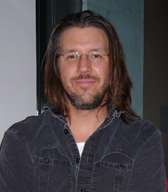“That what appears to be egoism so often isn't.”
Source: The Pale King
David Foster Wallace was an American writer and university instructor of English and creative writing. His novel Infinite Jest was listed by Time magazine as one of the hundred best English-language novels published between 1923 and 2005. His last novel, The Pale King , was a final selection for the Pulitzer Prize for Fiction in 2012.
The Los Angeles Times book reviewer David Ulin called Wallace "one of the most influential and innovative writers of the last twenty years". Wallace's works have influenced writers such as Dave Eggers, Zadie Smith, Jonathan Franzen, Elizabeth Wurtzel, George Saunders, Rivka Galchen, Matthew Gallaway, David Gordon, Darin Strauss, Charles Yu, and Deb Olin Unferth.

“That what appears to be egoism so often isn't.”
Source: The Pale King
Source: The Broom of the System
Source: This Is Water: Some Thoughts, Delivered on a Significant Occasion, about Living a Compassionate Life
“My chest bumps like a dryer with shoes in it.”
Source: Infinite Jest (1996)
“I cannot say what color Lenore Beadsman’s eyes are; I cannot look at them; they are the sun to me.”
Source: The Broom of the System
Source: The Best American Essays 2007
“They can kill you, but the legalities of eating you are quite a bit dicier.”
Source: Infinite Jest (1996)
“She was terrified of everything, and terrified to show it.”
Source: Brief Interviews with Hideous Men
Source: This Is Water: Some Thoughts, Delivered on a Significant Occasion, about Living a Compassionate Life
E Unibus Pluram: Television and U.S. Fiction
Essays
Source: A Supposedly Fun Thing I'll Never Do Again: Essays and Arguments
Context: The emergence of something called Metafiction in the American '60s was hailed by academic critics as a radical aesthetic, a whole new literary form, literature unshackled from the cultural cinctures of mimetic narrative and free to plunge into reflexivity and self-conscious meditations on aboutness. Radical it may have been, but thinking that postmodern Metafiction evolved unconscious of prior changes in readerly taste is about as innocent as thinking that all those college students we saw on television protesting the Vietnam war were protesting only because they hated the Vietnam war (They may have hated the war, but they also wanted to be seen protesting on television. TV was where they'd seen the war, after all. Why wouldn't they go about hating it on the very medium that made their hate possible?) Metafictionists may have had aesthetic theories out the bazoo, but they were also sentient citizens of a community that was exchanging an old idea of itself as a nation of do-ers and be-ers for a new vision of the U. S. A. as an atomized mass of self-conscious watchers and appearers. For Metafiction, in its ascendant and most important phases, was really nothing more than a single-order expansion of its own theoritcal nemesis, Realism: if Realism called it like it saw it, Metafiction simply called it as it saw itself seeing it. This high-cultural postmodern genre, in other words, was deeply informed by the emergence of television and the metastasis of self-conscious watching.
Federer as Religious Experience, New York Times, August 20, 2006
Essays
Infinite Jest (1996)
"The Suffering Channel", Oblivion: Stories
Short stories
Tennis Player Michael Joyce's Professional Artistry as a Paradigm of Certain Stuff about Choice, Freedom, Discipline, Joy, Grotesquerie, and Human Completeness
Essays
"Westward The Course Of Empire Takes Its Way", Girl With Curious Hair
Short stories
The Pale King (2011)
Commencement Address at Kenyon College. Gambier, Ohio. May 21, 2005.
Essays
E Unibus Pluram: Television and U.S. Fiction
Essays
Big Red Son
Consider the Lobster (2007)
Big Red Son, p. 16
Consider the Lobster (2007)
Big Red Son, on Las Vegas, NV
Consider the Lobster (2007)
"Big Red Son", p.29-30
Consider the Lobster (2007)
Every Love Story Is a Ghost Story: A Life of David Foster Wallace (2012)
A Supposedly Fun Thing I'll Never Do Again
Essays
Infinite Jest (1996)
“You know what your problem is, Hallie?' 'I have just one problem?”
Infinite Jest (1996)
“Can the decision to be less selfish ever be anything other than a selfish decision?”
Consider The Lobster
Essays
E Unibus Pluram: Television and U.S. Fiction
Essays
Federer Both Flesh and Not
Essays
"Mister Squishy", Oblivion: Stories
Short stories
E Unibus Pluram: Television and U.S. Fiction
Essays